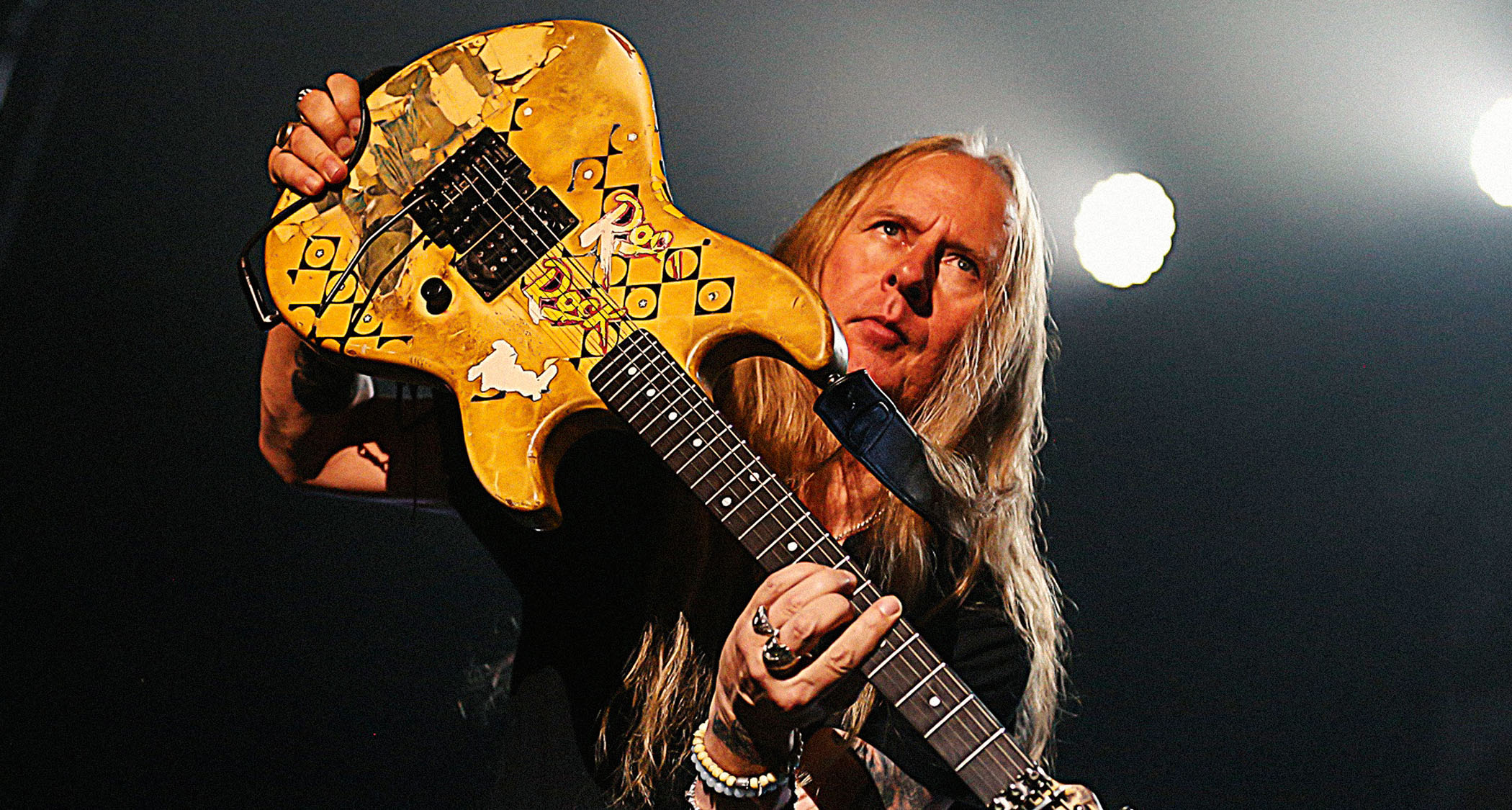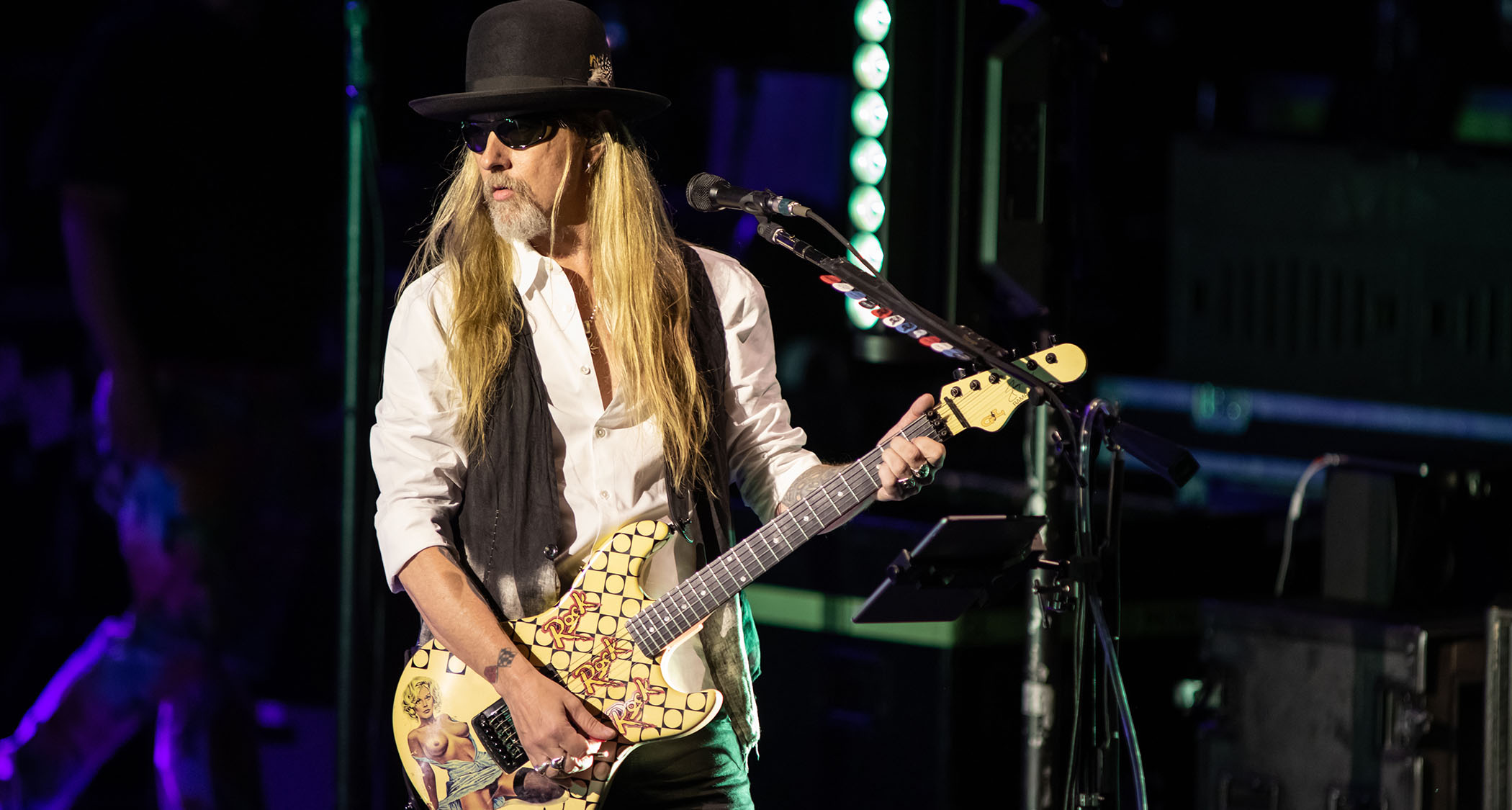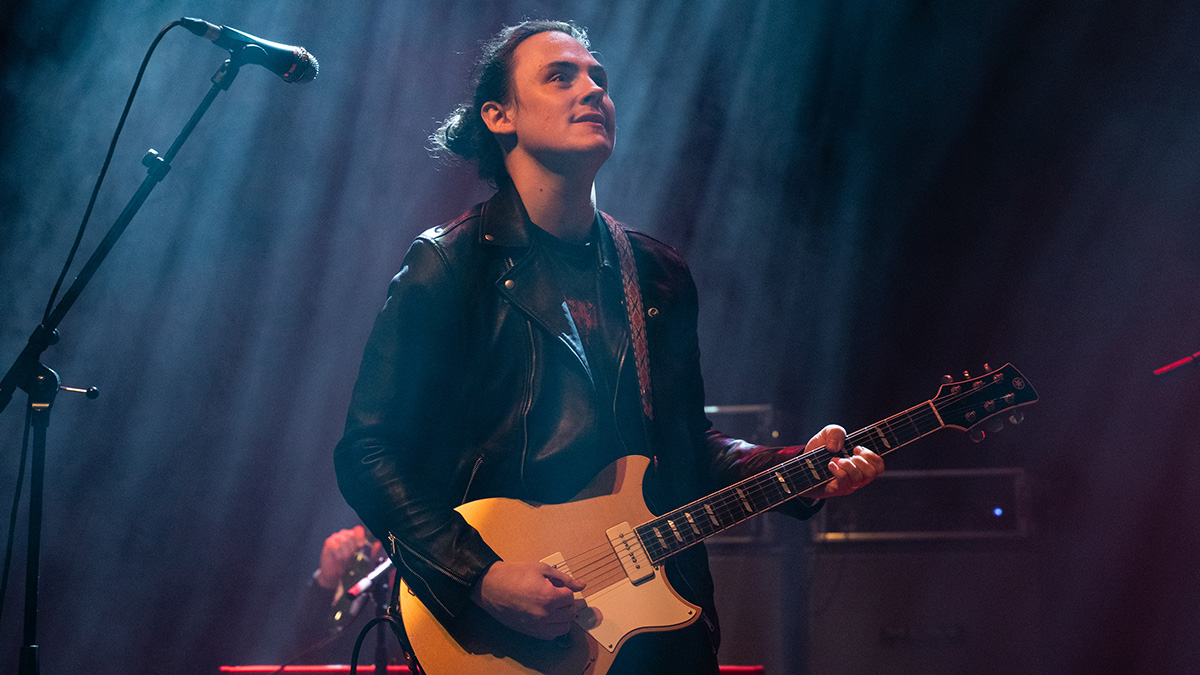“A lot of my peers have turned to modelers. I’m not there yet. It still feels like an electronic toy to me”: Jerry Cantrell on his love of guitar duos, vibing off Jeff Beck on his solo album – and why he remains a digital tone skeptic
The Alice In Chains guitarist discusses sticking to tubes, breaking out the talkbox and the potty-mouthed solo sessions behind his new album I Want Blood

Jerry Fulton Cantrell Jr. is a master storyteller. If you’ve listened to any of his recordings with Alice In Chains or as a solo artist, you’ll know he has a panache for getting to the heart of the emotion behind the music, embedding the listener deep within the sonic world he’s created.
The pictures he paints using his guitar and voice feel inexplicably vivid, attacking the human senses from all mediums, with melodies and harmonies you can almost touch, see and taste.
In the early ’90s, Cantrell’s powerful chemistry with singer Layne Staley made Alice In Chains one of the most influential bands in an era when Seattle was the crucible of alternative rock.
There was an intense emotional darkness in their music – not only in heavy, riff-driven songs such as Man In The Box, We Die Young, Would? and Rooster from the albums Facelift and Dirt – but also in the beautiful acoustic tracks laid down on the EPs Sap and Jar Of Flies.
But even without Staley, who died in 2002, Cantrell has steered Alice In Chains through a second phase with frontman William DuVall alongside the classic-era rhythm section of bassist Mike Inez and drummer Sean Kinney on three acclaimed studio albums.
And while the band has kept Cantrell busy since 2005, recent years have seen him working again as a solo artist. His 2021 album Brighten was his first solo release in almost two decades since 2002’s Degradation Trip.
And now comes I Want Blood, a more up-tempo and hard-hitting record than the acoustic-focused Brighten. It proves that Jerry Cantrell’s creative remit is one that’s unusually broad for an artist working within the confines of rock. The sky really is the limit for this guitar hero…
All the latest guitar news, interviews, lessons, reviews, deals and more, direct to your inbox!
This album has more distorted electric guitars and less acoustics that your last one. What made you want to take off the cowboy hat and get heavy?
“The last one probably had some country tinges, but if you were expecting another one of those, well, I just did that! If you look at my discography and listen to what came before what followed, the next one usually doesn’t match the last. That’s what I find fun. I don’t know where it’s going when I start.
“The cool thing for me is we covered a lot of ground early on in Alice In Chains. People got used to us doing face-melting f*ckin’ metal stuff to acoustic things like Sap or Jar Of Flies. We cut a pretty wide field for us to play on early on and that’s something I always do, whether it’s with Alice or not. I like to explore all the space.”
It’s interesting what happens when you submit and go with the flow.
I am not a shredder. I wish I could shred, but I kind of gave up that conquest years ago!
“Yeah! I don’t sit down and think I’m going to write a heavy or acoustic record. I just get the urge to take the journey and create something. That’s part of the fun. You’re operating in the dark. I don’t have a light... alright, maybe a little flame in front of my face, but that’s it. I look to create things that don’t exist, making something out of nothing.
“It’s always interesting to see where I end up. I like the heavy stuff as well as spacious, acoustic ideas and everything in between. I’m very proud of this record, it’s got some ferocity and teeth to it. I’m glad it’s nothing like the last one!”
The lead track, Vilified, has some atmospheric harmonised leads rather than full-blown shredding. Your solos always make a point, serving the song first and foremost.
“I make do with what I can do. As you correctly stated, I am not a shredder. I wish I could shred, but I kind of gave up that conquest years ago! I always treat my solos like a scene change. I try to make them singable. Those seem to be the solos that have the longest lasting impact with me as a fan.
“I like the melodic, cool things that have more vibe than technical prowess. Sure, I can play, but there are plenty of guys out there who could smoke me technically. I do what I do, and would like to think I do it well. And yeah, with every record, it’s interesting to see what I can achieve through harmonies.
“I’m such a huge fan of guitar duos. I hear Glenn Tipton and K.K. Downing. I hear the Schenker brothers. I hear Kirk and James from Metallica. I hear Joe Perry and Brad Whitford. I love Thin Lizzy, what can I say? Those elements are always in me.”
The lyrics to Vilified discuss the topic of A.I. – which begs the question, have you ever plugged your guitar into your laptop or amp modeler?
“I look at them as tools, but I prefer old analogue tube amps. When I record, that’s pretty much what I use. I have used a Fractal, Kemper or plug-in in the past, just for little parts to create an effecty-type thing.
“But in the demo process, I’m almost exclusively playing through my Kemper. I’ve got every amp I’ve ever played through, plus everyone else’s loaded into that thing, including bass amps. It’s a great tool for not having to carry a bunch of gear around.
“My studio is very spartan and lo-fi. It’s just a little Pro Tools rig and a Kemper with some guitars and basses on the walls. I will usually do the basses through a Sans Amp direct. That’s the demo process. When I get to the real recording, I start whipping out the tube amps, analogue effects and all that stuff.”
A lot of players use digital gear to make touring easier, too. Have you ever tried that?
“I’m reluctant to use digital gear live, but a lot of compatriots think that the technology is getting better. I understand that moving heads and cabs around internationally comes at an astronomical price. A lot of my peers have turned to Fractals as a smaller and inexpensive way to get close to their sound. I have looked at that but I’m not there yet.
I’m not an audiophile when it comes to every guitar, effect and amp. I try to keep my focus on a narrower zone for creation
“I’ve done a few gigs outside of the US with those things and it still feels like a fuckin’ electronic toy to me. But I think Metallica guys were the first ones I heard about using those live. I was like ‘Fuck, man, what are you playing through?’ and they’d tell me it was a Fractal. So it definitely can sound good.
“But, like anything else, you’ve got to know that tool and spend the time or have somebody around who knows how to run those things. I’m about as dumb as it gets when it comes to being a gearhead.
“I’m the guy who owns a 1963 and 1967 Corvette, but couldn’t do anything mechanically on them. But I know people who can keep them running! I’m not an audiophile when it comes to every guitar, effect and amp. I try to keep my focus on a narrower zone for creation.”
You once said you got into vibe pedals like your Rotovibe because of Robin Trower’s tone on Bridge Of Sighs. Now, there’s a sound…
“Oh, for sure! I think there’s a solo section in the song It Comes that references that. My producer on this album, Joe Barresi, is a big gear nut and guitar head. It’s really fun working with him because he has just about every colour, paintbrush and canvas you can think of.
“We were tripping on Robin Trower and Jeff Beck while making this record, watching old clips of Robin with the vibe or Jeff using his old school talk box in between takes. When it came to that solo, I think we used a Rotovibe and something else to get the Trower sound.”

The intro for Off The Rails almost has a cheeky nod to Iron Maiden’s Wasted Years. Can you hear it?
“Fuck yeah, dude! I’m a huge fan of Iron Maiden. I wanted Alice to be a guitar duo band precisely because of bands like that. And we kind of are, now, since William DuVall joined. Earlier on, Layne would pick up a guitar and play a little bit, but we were mostly just a three-piece with a singer. Now we actually have two guys playing a lot of guitar, so I got my wish!
“But when we initially talked about starting a band, I wanted another guitar player and that was purely because of Dave Murray and Adrian Smith. Or the guys from Priest or Aerosmith. I love the Young brothers [Angus and Malcolm, of AC/DC fame]. There’s something special about bands with two guitar players working as a unit.
“And you’re right, I hear Iron Maiden in that intro for Off The Rails. I’m immediately drawn to those flavours, just because I love that band. It’s cool to hear your influences coming out organically, because you don’t sit down and intend to do anything. It just happens and you can tell that it’s in there.”
Duff McKagan says you swear a lot and are fighting for your leads when recording a solo. Is that true?
“Making music is a really joyous thing in the end, and the process is enjoyable too, but it’s a battle, man! You don’t have to travel very far to bump into the edge of your limitations! But that’s also part of the process and also part of the challenge. Can you put together something together that’s pretty cool?
“You end up surprising yourself a lot of the time. It’s like, ‘I didn’t think I could pull that off!’ That’s exciting, it keeps you interested. Duff’s right, by the way. If you’ve ever been in the studio with me, you’d think I had Tourette’s! I’ve got the worst gutter mouth in the world.
“When I get frustrated or blow something, it erupts. It’s not at anybody, it’s just the situation, man. So I’m talking to me but it’s like, ‘Fuck, man, goddamit!’ There’s a lot of that. If you’re faint of heart and can’t stand some blue exclamations from time to time, it’s probably not very fuckin’ peaceful to be with me in a studio. But it’s actually pretty funny…”
You tend to stick with your main Les Paul and G&L guitars going into your signature Friedman amps. Was there anything else on this album?
“We did make a little bit of a change, going a little more retro and looking back to the earlier years of Alice. We dug out the old Bogner Fish preamp. I think I used a VHT power amp with it back in the old days but now it’s a Fryette, which works really well. When I started talking to Joe, he said we should switch that Fish back in.
“I didn’t even know if it worked but he was like, ‘Well, let’s get it over to Reinhold [Bogner] and get it tuned up.’ Then Reinhold got hold of it, tuned it up and put it side by side with his Fish. Then he said mine sounded better, because of the weird tubes somebody put in over the years. And he didn’t want to f*ck with it because three of my channels sounded better, while only one of his to mine.
“So we only used my Friedman JJ on a couple of songs, and the rest was the Bogner Fish. And there was also a sprinkle of the old Rockman stuff I had used on Facelift and Dirt. That was the main core rig, but we had Wizards, Oranges and a Bogner Snorkler for layering.”
Which guitars won the shoot-out, then?
“There were three we kept coming back to. I used a ton of guitars on this record. Billie Joe Armstrong gave me one of his Juniors a couple of years ago. I used that on quite a few tracks for rhythms and stuff like that. We really leaned heavily on my original Blue Dress and No War G&Ls, plus my D-Trip Les Paul, also with SGs, Teles and Vs going on top.
“We even used a Steve Miller Ibanez Iceman on something with all sorts of cool pedals. And that Jeff Beck talkbox I mentioned earlier is on there, too – one of those old-school bag things [The Bag]. It has a thin tube and a bit you put in front of your teeth.
“Joe Barresi pulled it out, you wear it kinda like a strap and hold it under your arm. It was very cool, I’d never seen one of those before. We did a few tracks with that, including the breakdown of Vilified.”
G&L recently announced they were bringing the Rampage back, which will make a lot of Alice In Chains fans happy…
“Yeah! It is cool. And they’ve said they’ll add a couple of frets to it, and that’s two more frets I’ll have to swear at as I try to play! I love G&L. I’ll be forever tied to those guys, I love their guitars. They’re a great company. It’s the guitar that’s always felt right to me. That and the Gibson Les Paul.
“The way I see it, there are only two guitar brands I play – my G&Ls and my Gibsons. Those have been the main axes on every record. And I’ve actually been talking to Gibson about doing another guitar or two for this cycle, so who knows, there might be more to come there…”
- I Want Blood is out now via Double J.
Amit has been writing for titles like Total Guitar, MusicRadar and Guitar World for over a decade and counts Richie Kotzen, Guthrie Govan and Jeff Beck among his primary influences as a guitar player. He's worked for magazines like Kerrang!, Metal Hammer, Classic Rock, Prog, Record Collector, Planet Rock, Rhythm and Bass Player, as well as newspapers like Metro and The Independent, interviewing everyone from Ozzy Osbourne and Lemmy to Slash and Jimmy Page, and once even traded solos with a member of Slayer on a track released internationally. As a session guitarist, he's played alongside members of Judas Priest and Uriah Heep in London ensemble Metalworks, as well as handled lead guitars for legends like Glen Matlock (Sex Pistols, The Faces) and Stu Hamm (Steve Vai, Joe Satriani, G3).











